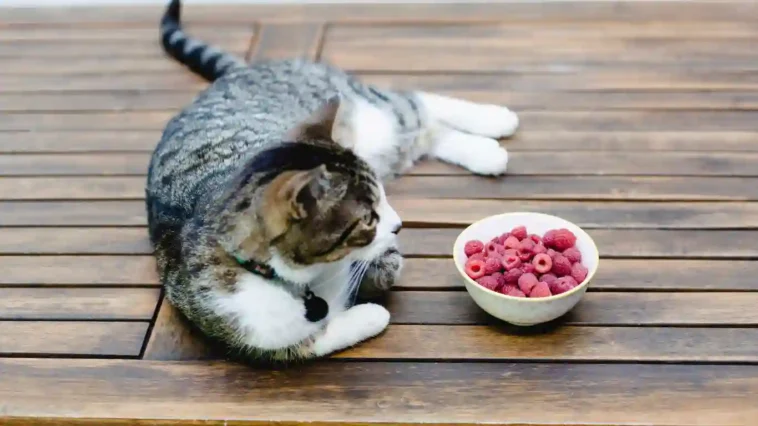Have you ever been enjoying a handful of raspberries when your cat suddenly appears wide-eyed and curious? Maybe they sniff the berry, bat it around with a paw, or even take a nibble. It’s adorable—but also a little nerve-wracking. You might wonder, “Can cats eat raspberries? Or am I accidentally feeding my cat something risky?”
The good news? Raspberries aren’t toxic to cats. But that doesn’t mean they’re always a good idea. Like many human foods, they sit in a gray area—okay in tiny amounts, but not something your cat should snack on regularly.
Are Raspberries Safe for Cats?
Yes, cats can eat raspberries in small amounts. A fresh, ripe raspberry here and there won’t harm your cat. Many felines enjoy the texture and scent. But before you start offering them up as treats, you should keep a few things in mind.

Cats are obligate carnivores, meaning their bodies are built to thrive on meat. While not harmful in tiny doses, fruits aren’t part of their natural diet. Raspberries are high in fiber, vitamin C, and antioxidants for humans—but those benefits don’t carry over the same way for cats.
How Many Raspberries Can a Cat Eat?
Think of raspberries as a rare treat—not a regular snack. One small raspberry, once in a while, is plenty. Anything else can upset your cat’s stomach and cause diarrhea or gas.
Also, not all cats digest fruits the same way. Some may be fine with a nibble, while others might show signs of discomfort. Always start slow. Watch for any changes in behavior or digestion afterward.
Can Cats Eat Raspberry Yogurt?
This is a common question—especially if you’re eating raspberry yogurt and your cat is begging for a taste.
While a lick or two of plain yogurt is usually safe for most cats (thanks to the beneficial probiotics), raspberry yogurt isn’t ideal. Here’s why:
- It often contains added sugars or artificial sweeteners, which aren’t safe for cats.
- Lactose in dairy can upset your cat’s stomach, especially if lactose intolerant (which many adult cats are).
- Fruit-flavored yogurts can include preservatives or fruit syrups, which are not cat-friendly.
So, if your cat accidentally gets a tiny lick from your spoon, it’s not a big deal. But it’s better not to offer it intentionally.
Can Cats Eat Raspberry Jam?
This one’s a clear no. While it might seem harmless, raspberry jam is packed with sugar, and many brands even include preservatives or artificial sweeteners like xylitol, which is toxic to cats.
Even homemade jams aren’t a good idea. The sugar content alone is enough to cause a problem, not to mention the potential for stomach upset.
If your cat happens to lick a bit off your plate, they’ll likely be okay—but don’t make a habit of it.
Can Cats Eat Raspberries Seeds?
Cats can eat raspberry seeds, but they’re not recommended intentionally. Raspberry seeds are small and usually pass through the digestive system without issue. That said, they don’t offer any nutritional benefits to your cat.
Too many seeds could irritate sensitive stomachs. If you’re giving your cat a raspberry, you don’t need to remove the seeds, but you shouldn’t go out of your way to feed them seeded berries regularly.
Are There Any Benefits of Raspberries for Cats?
For cats? Not really.
While raspberries are rich in antioxidants and vitamin C, cats don’t process these nutrients like humans do. Their bodies already make their vitamin C, so they don’t need extra fruit.
That said, raspberries are low in calories and don’t contain toxic compounds—so as a tiny treat, they’re okay. Don’t count on them to add anything meaningful to your cat’s health.
Risks of Feeding Raspberries to Cats
Like many human foods, the key issue is moderation. Here are a few things to watch out for:
1. Stomach Upset
Too much fruit can cause vomiting or diarrhea. If your cat has a sensitive stomach, even a small amount could lead to discomfort.
2. Sugar Content
Even natural sugars in fruit aren’t great for cats. Their bodies aren’t wired to handle sugary foods, and too much sugar over time can contribute to weight gain or other health issues.
3. Allergic Reactions
It’s rare but possible. If you notice itching, swelling, or breathing issues after your cat eats raspberries, stop immediately and call your vet.
Healthier Treat Alternatives for Cats
If you’re looking for safe, healthy treats, there are plenty of better options than raspberries:
- Cooked chicken or turkey (unseasoned)
- Freeze-dried meat treats
- Catnip or cat grass
- Canned tuna (in moderation)
- Plain pumpkin (great for digestion)
These treats align more with your cat’s natural diet and are less likely to cause issues.
How to Safely Offer Raspberries to Your Cat
If you want to treat your cat with a raspberry:
- Use fresh, organic berries (avoid pesticides or sprays).
- Wash thoroughly to remove any residue.
- Offer just one berry—and watch how your cat reacts.
- Don’t mix it with yogurt, jam, or other sweet foods.
It’s also okay if your cat turns their nose up at it. Not all cats are interested in fruit, and that’s normal.
FAQs
Can cats eat frozen raspberries?
Yes, but make sure they’re unsweetened and thawed first. Cold berries could upset sensitive tummies.
Are raspberries toxic to cats?
No, they’re not toxic. But they should only be fed in small amounts and not regularly.
What happens if a cat eats too many raspberries?
They might experience diarrhea, vomiting, or an upset stomach. It’s not usually dangerous, but monitor them and call your vet if symptoms persist.
Can kittens eat raspberries?
It’s best to avoid giving fruit to kittens. Their digestive systems are still developing, and meat-based diets are more appropriate.
Why does my cat like raspberries?
Some cats are curious about the smell or texture. It’s usually harmless curiosity—but don’t assume that interest means it’s good for them.
A Gentle Reminder from One Cat Lover to Another
It’s sweet when our cats want to share what we’re eating. That little nose sniffing around your snack can feel like love—and it is. But not everything we eat is good for them, even if it seems harmless.
Raspberries won’t hurt your cat in tiny amounts, but they’re nothing to add to the treat jar. If you’re ever in doubt, remember that a simple ear scratch or a soft blanket means more to your cat than any fruit ever will.
So enjoy your raspberries—and give your feline friend something more fitting for their purring little belly.
Want to treat your cat right? Stick to what nature designed them for: meat, love, and a safe, cozy space beside you.








GIPHY App Key not set. Please check settings